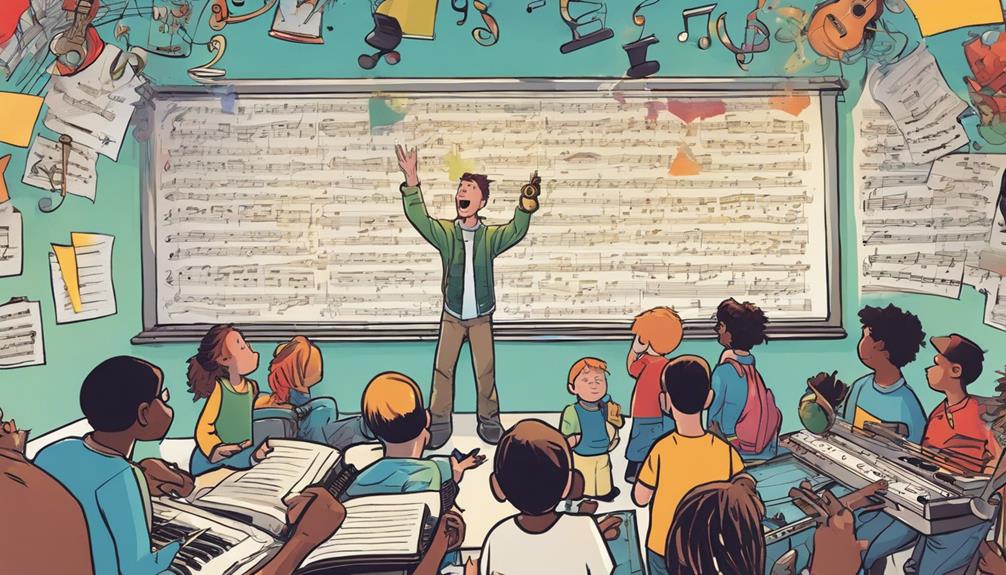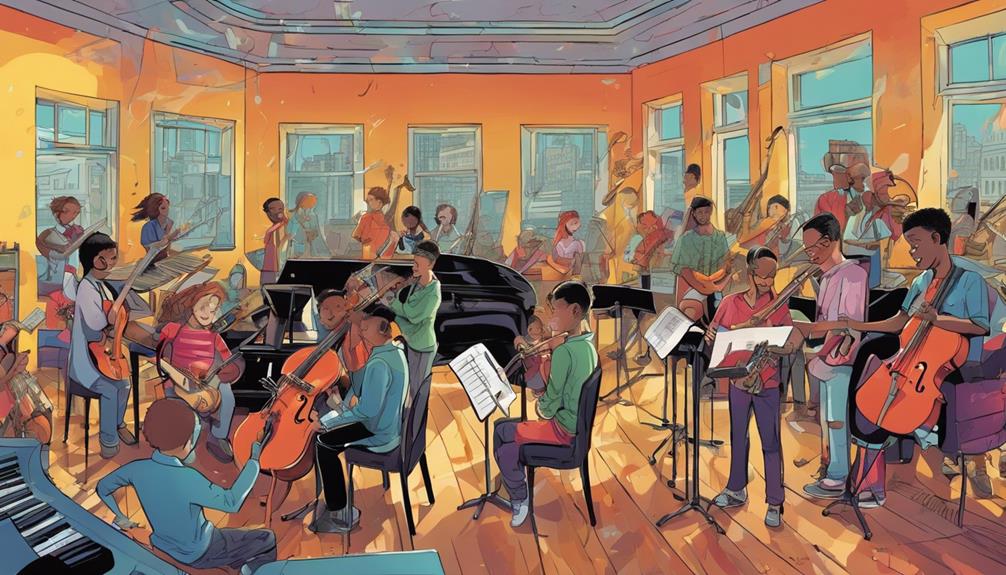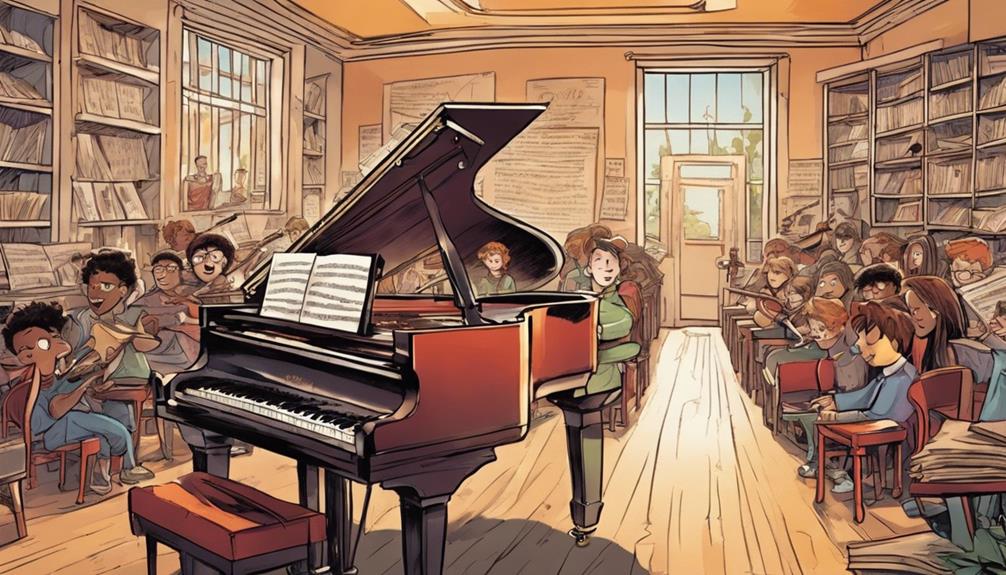To start your music school journey, prioritize finding a location with high foot traffic and visibility, near family-friendly neighborhoods or schools. Develop a professional website and social media presence, and network with local music teachers and businesses. Innovative teaching methods, like incorporating technology and interactive tools, will enhance your curriculum. Effective marketing strategies, such as targeted online ads and collaborations with influencers, will help attract students. By overcoming common obstacles, like resource limitations and fear of failure, you'll set your school up for success. Now, take the next step and discover how to turn your passion into a thriving music school.
Key Takeaways
- Choose a high-traffic location with easy accessibility, researching demographics and nearby family-friendly areas.
- Build a professional online presence through a website, social media, and online registration and payment options.
- Develop a dynamic curriculum with innovative teaching methods, incorporating technology and interactive tools.
- Utilize targeted online advertising, influencer partnerships, and local community outreach to attract students.
- Overcome challenges by seeking partnerships, managing time effectively, and embracing failures as opportunities for growth.
Choosing the Right Location
Prioritizing high foot traffic and visibility when selecting a location for your music school is essential to attract potential students and set your business up for success. You'll want to choose a location that's easily accessible for students and parents, considering factors like parking availability and public transportation options. It's also vital to research the demographic makeup of the area to make sure there's a demand for music education services.
For instance, if you're targeting young children, you may want to locate near family-friendly neighborhoods or schools.
When evaluating potential locations, consider the space requirements for your music school. You'll need rooms for classes, practice sessions, and common areas where students can relax. Make sure the location can accommodate your needs without breaking the bank. Calculate the cost of rent or lease and factor it into your budget and financial projections.
Building an Online Presence

Now that you've secured a prime location for your music school, it's time to build an online presence that effectively showcases your school's unique value proposition and attracts potential students. A professional website is essential, highlighting school details, faculty bios, and program offerings. This will help establish credibility and provide a central hub for information.
| Online Presence | Benefits | Action Items |
|---|---|---|
| Website | Establish credibility, showcase programs | Develop a website with school details, faculty bios, and program offerings |
| Social Media | Engage with community, share achievements | Create Facebook, Instagram, and YouTube accounts |
| Online Registration | Streamline enrollment, reduce paperwork | Develop online registration forms and payment options |
| Email Marketing | Promote events, workshops, and offers | Create email marketing campaigns to reach a wider audience |
Network and Collaborate Locally

By building relationships with local music teachers, schools, and businesses, you can create a strong support network that helps you reach a wider audience and stay connected to the community. This network can provide valuable resources, expertise, and opportunities for collaboration.
Here are three ways to network and collaborate locally:
- Teach music together: Collaborate with local music teachers and schools to share resources and expertise. This can include co-teaching classes, sharing lesson plans, or hosting workshops together.
- Attend music education conferences: Attend local music education conferences and networking events to connect with other music professionals, learn about new trends and best practices, and stay updated on industry developments.
- Partner with local businesses: Partner with local businesses to promote your music school and reach a wider audience. This can include hosting events, offering joint promotions, or creating sponsorship opportunities.
Innovative Teaching Methods
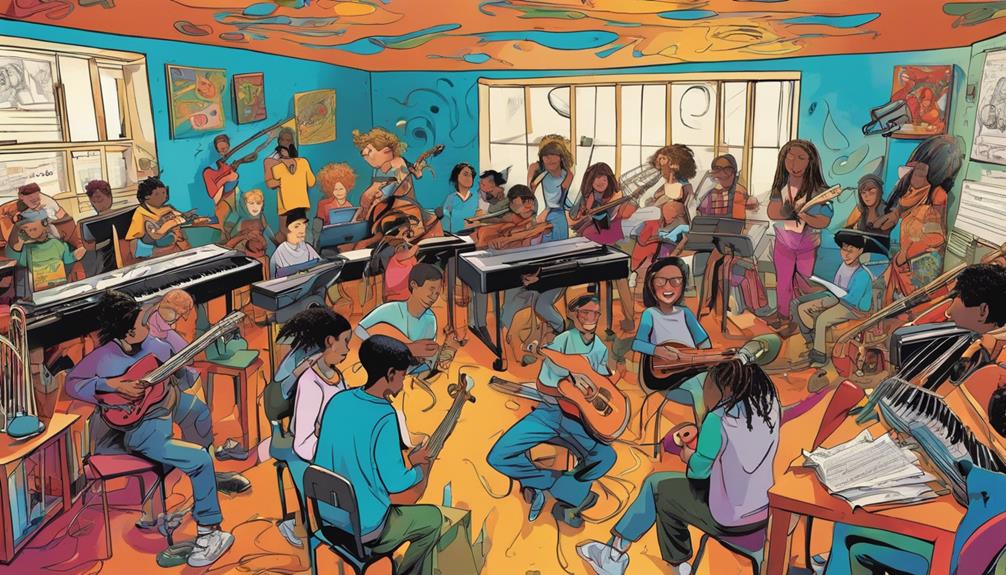
To stay ahead of the curve and engage your students, incorporate innovative teaching methods that make learning music fun, interactive, and relevant to their lives.
One way to do this is by utilizing technology, such as music production software and online resources, to enhance the learning experience. Interactive learning tools like educational apps, virtual instruments, and online tutorials can also increase student engagement.
Additionally, introducing creative projects like songwriting workshops, music composition challenges, and collaborative performances can foster creativity and motivation.
To make learning even more enjoyable, consider incorporating gamification techniques, such as music theory games and practice incentives, to make the process fun and motivating.
Peer-to-peer learning is also essential, so encourage group activities, ensemble performances, and student-led workshops to build teamwork and communication skills.
Curriculum Development Strategies

Your music school's curriculum should be a dynamic, student-centered framework that caters to diverse learning styles, genres, and skill levels, offering a well-rounded music education experience. To achieve this, you'll need to develop a curriculum that's engaging, structured, and continuously refined. Here are some strategies to explore:
- Incorporate a mix of genres and formats: Offer classes in classical, contemporary, and other genres to attract a broad audience and cater to diverse interests.
- Provide a range of learning experiences: Include group lessons, individual instruction, and workshops to accommodate different learning styles and preferences.
- Stay current and innovative: Collaborate with instructors and music education experts to incorporate new teaching methods and materials, ensuring your curriculum remains fresh and inspiring.
Hiring and Training Instructors
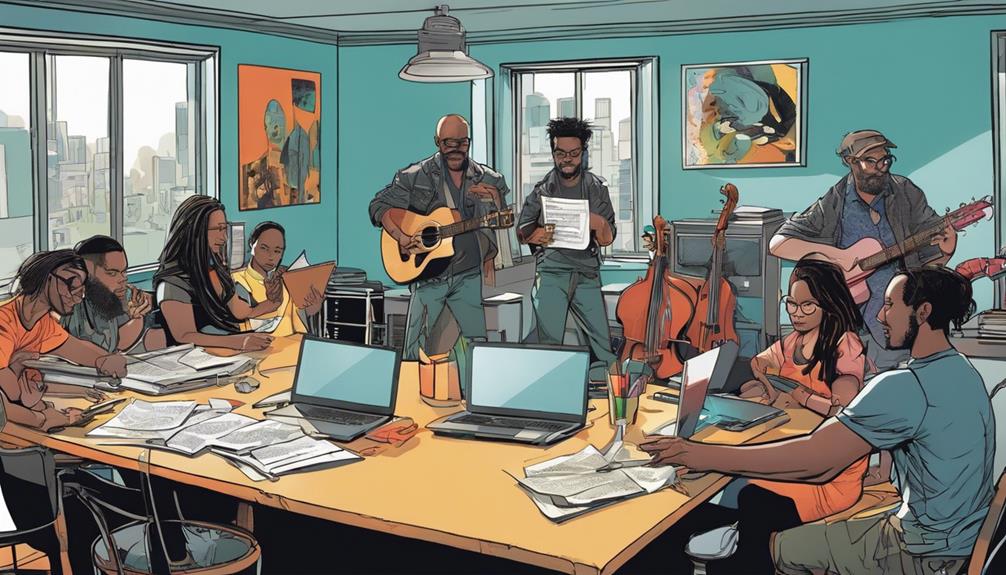
With a well-structured curriculum in place, you're now ready to build a team of talented instructors who can bring your music school's vision to life.
When hiring instructors, look for those with a minimum of a Bachelor's degree in music education or a related field. This guarantees they've a strong foundation of knowledge and expertise. Prioritize instructors with experience teaching students of varying ages and skill levels, as this will allow you to cater to a diverse student body.
Don't stop at hiring; provide ongoing professional development and training opportunities to enhance their teaching skills and stay current with music education trends.
Conduct thorough interviews and audition processes to assess potential instructors' musical proficiency, teaching style, and compatibility with your school's values. This will help you find the right fit for your school.
Finally, create a supportive and collaborative environment for instructors to exchange ideas, share best practices, and continuously improve their teaching methods.
Creating a Supportive Environment
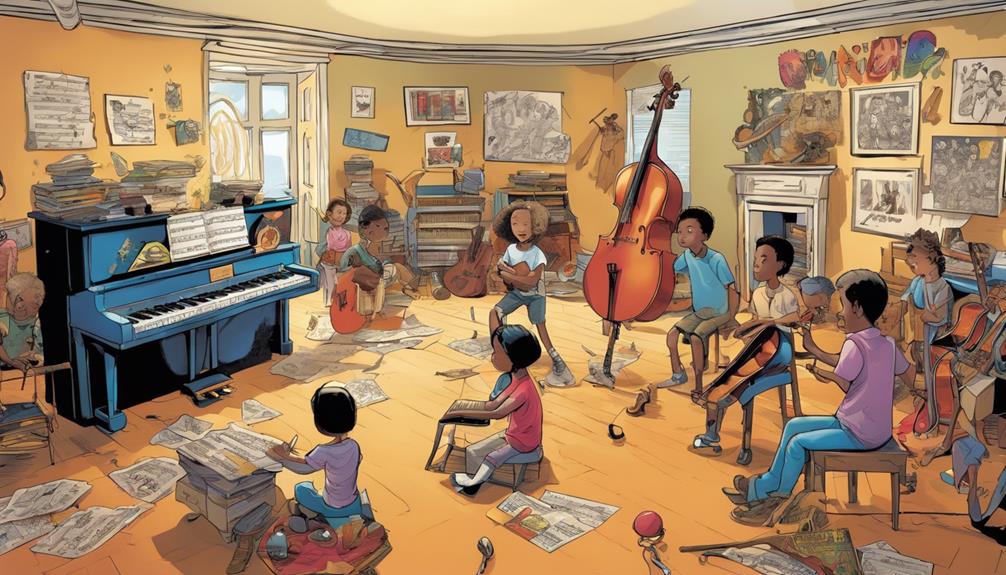
By designing a welcoming and functional space, you're laying the groundwork for a supportive environment that fosters learning, creativity, and community. As you plan your music school, consider the physical space and how it can enhance the learning experience.
Here are three key elements to focus on:
- Acoustics and Equipment: Design inviting spaces with acoustics in mind, and provide well-equipped practice rooms with quality instruments and technology for student use.
- Comfort and Amenities: Offer comfortable waiting areas for parents with amenities like seating, refreshments, and Wi-Fi, making them feel at ease while their children learn.
- Inspiring Ambiance: Enhance the ambiance of the school with inspiring decor, music-themed artwork, and motivational quotes, creating an environment that motivates students to learn and grow.
Marketing and Promotion Techniques

As you launch your music school, it's essential to develop a marketing strategy that showcases your unique offerings and attracts potential students.
You'll want to leverage social media campaigns to share student performances and target online advertising to reach a wider audience.
Social Media Campaigns
You can greatly expand your music school's online presence and attract new students through strategic social media campaigns that showcase your school's unique value proposition. By leveraging platforms like Facebook, Instagram, and YouTube, you can reach a wider audience and engage with potential students in a more personalized way.
Here are three key strategies to get you started:
- Create engaging content: Share videos of student performances, testimonials, and behind-the-scenes glimpses of your music school to attract interest and build a sense of community.
- Use targeted advertising: Reach specific demographics interested in music education and lessons through targeted ads on social media, ensuring your message resonates with the right people.
- Collaborate with influencers: Partner with influencers or music-related accounts to increase visibility and credibility for your music school, tapping into their existing audience and expertise.
Targeted Online Advertising
Target your ideal students with precision by leveraging targeted online advertising, which allows you to reach potential students based on demographics, interests, and online behavior. This powerful marketing technique enables you to create tailored campaigns that resonate with your target audience. Utilize platforms like Google Ads and Facebook Ads to create campaigns that maximize your impact. With these platforms, you can set specific parameters to target students who are likely to be interested in your music school.
To ensure your campaigns are effective, track their performance through analytics. This will help you optimize your marketing strategy and make data-driven decisions. Additionally, implement retargeting techniques to re-engage with individuals who've visited your website but haven't converted yet. This will help you stay top of mind and encourage them to take the next step.
Local Community Outreach
By expanding your reach beyond online advertising, you can tap into the local community's potential by engaging in outreach efforts that foster connections and build buzz around your music school. This involves collaborating with local schools and community centers to offer music workshops and demos, attracting potential students and showcasing your expertise.
Some effective local outreach strategies include:
- Partnering with local businesses for cross-promotional opportunities, such as offering discounts or hosting joint events.
- Attending community events and fairs to showcase your music school, distribute flyers, and network with potential students and parents.
- Utilizing social media platforms to promote upcoming events, student performances, and special promotions, engaging with the community and keeping them informed about your music school.
Additionally, consider offering scholarships or discounts to students from underserved communities to promote inclusivity and diversity in your music school. By engaging with your local community, you can build a loyal student base and establish your music school as a valued resource in the area.
Overcoming Common Obstacles

As you commence on starting your own music school, you'll likely face some common obstacles that can make or break your venture.
You may struggle with a lack of resources, fear of failure, or time management challenges, which can be overwhelming if not addressed properly.
Lack of Resources
When starting your own music school, one of the most significant challenges you'll face is securing the resources needed to provide quality education, from instruments and technology to facilities and faculty. This can be a daunting task, especially if you're on a tight budget. However, there are ways to overcome this obstacle.
Here are three strategies to explore:
- Partnerships and discounts: Seek partnerships with local music stores or instrument manufacturers to acquire resources at discounted rates.
- Crowdfunding and sponsorships: Utilize crowdfunding platforms or seek sponsorships from businesses interested in supporting music education.
- Grants and leasing: Apply for grants from music education foundations or government agencies to secure funding for necessary resources, and explore equipment leasing or rental options to access instruments and technology without large upfront costs.
Fear of Failure
Starting your own music school can be an intimidating venture, and it's natural to feel a knot in your stomach as you confront the very real possibility of failure. Fear of failure is a common obstacle many new entrepreneurs face when starting a music school. However, it's essential to acknowledge that failure is a natural part of the learning process and can lead to valuable lessons.
Instead of letting fear hold you back, focus on your passion for music and the positive impact you can make through your school. Remember, every successful music school owner has faced setbacks and failures along the way. Seek support from mentors, fellow music educators, and business advisors to navigate challenges and build resilience.
When you do encounter failures, embrace them as opportunities for growth and transformation in your journey towards establishing a successful music school. By shifting your perspective and seeking support, you can overcome the fear of failure and stay committed to your vision of creating a thriving music school that inspires and educates others.
Time Management Challenges
You'll frequently find yourself juggling multiple roles – administrator, teacher, and business developer – which can quickly lead to time management challenges that threaten to derail your music school's success. As a music school owner, it's crucial to prioritize tasks, set clear goals, and delegate responsibilities to overcome these challenges.
Here are three strategies to help you manage your time effectively:
- Implement efficient scheduling systems:
Utilize technology to streamline administrative tasks, such as scheduling lessons and managing student data.
- Delegate responsibilities:
Identify tasks that can be assigned to staff or freelancers, allowing you to focus on high-priority tasks.
- Regularly review and adjust workflows:
Periodically assess your workflows, schedules, and priorities to make sure they align with your goals and adjust as needed.
Frequently Asked Questions
How to Create a Music School?
To create a music school, you'll need to develop a diverse curriculum, hire passionate instructors, establish a welcoming space, and implement effective marketing strategies to attract students and build a strong community presence. To create a music school that truly stands out, it’s essential to invest in high-quality instruments and technology that support both traditional and modern teaching methods. Additionally, fostering partnerships with local organizations and hosting events like recitals or workshops can help raise awareness and strengthen connections within the community. By focusing on both education and engagement, you’ll create a music school that inspires and nurtures future musicians.
How to Grow a Music School?
To grow your music school, offer trial classes and open houses, leverage social media and referrals, improve teaching and curriculum, and utilize management software to streamline operations and build a supportive local network.
How Much Do Music School Owners Make?
"Think you'll be rolling in dough as a music school owner? Think again But, realistically, you can earn $30,000 to $80,000 annually, depending on factors like location, size, and student enrollment."
Can You Go to Music School as a Beginner?
Yes, you can definitely go to music school as a beginner. Music schools offer programs specifically designed for beginners, providing a supportive environment to learn music theory and instrument skills from experienced instructors.
Conclusion
As you've reached the final note of this journey, you've composed a symphony of knowledge to create your own music school. Like a conductor leading an orchestra, you've harmoniously blended:
- location
- online presence
- networking
- innovative methods
- curriculum development
- instructor training
- support
- marketing
- obstacle navigation
Now, take the stage, and let your music school resonate with the community, filling the air with the sweet sound of success.

